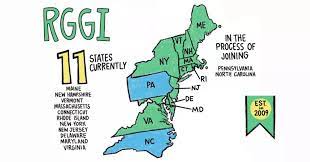Regional Greenhouse Gas Initiative (RGGI) Successful But Who Cares in Virginia?
From an Article by Rebecca R. Rubin, Virginia Mercury, July 3, 2023
RGGI’s track record clearly demonstrates we need not choose between clean air, affordable electricity and a strong economy.
In June, Virginians were inundated with smoke from wildfires that have been raging across Canada and could continue through the summer in the worst wildfire season in that nation’s history – a crisis that scientists agree is being driven by climate change.
Thousands of miles from the flames, we Virginians suffered levels of air quality ranging from unhealthy to hazardous, disproportionately impacting children, the elderly and those with preexisting respiratory conditions. Environmental agencies advised those of us who could to stay indoors. School and recreational youth athletics and other outdoor events were canceled.
And as smoke blotted out the sun, turning blue skies gray and orange, the Youngkin administration worked to dismantle one of our best tools to address climate change, protect clean air and secure a livable future for our children.
Wednesday, June 7, Youngkin’s majority of the State Air Pollution Control Board voted to end Virginia’s participation in the Regional Greenhouse Gas Initiative (RGGI), a multi-state cap-and-invest program that has been cutting pollution and driving the clean energy transition in Virginia, and throughout the Northeast and Mid-Atlantic, while returning hundreds of millions of dollars of revenue to our state to fund vital resiliency and energy efficiency programs.
The repeal regulation is now under review by Gov. Youngkin, who will likely add it to the Virginia Register. It is widely expected that the repeal will face legal challenges from the public and environmental groups.
With no funding or policies — economic or otherwise — in place to replace this program, this short-sighted rollback leaves Virginia’s localities on their own to fund vital infrastructure, and takes cost-saving energy efficiency resources away from low-income Virginians. It also signals to energy producers that under Youngkin’s watch, they can continue pumping air pollution into communities unabated — which negatively impacts public health and significantly curtails our resiliency efforts — when we need to cut emissions and build a livable future. With this, and to put it charitably, we have indeed reached the pinnacle of mediocrity.
This repeal effort also flies in the face of the clear public support behind the RGGI program — two-thirds of Virginia voters polled support staying in the program, and those who submitted comments to the Board overwhelmingly opposed Youngkin’s rollbacks.
Most importantly, in 2020 the General Assembly legislated joining the RGGI program, making it the law of the Commonwealth. Youngkin has a constitutional mandate to “take care that the laws be faithfully executed.” His effort to single-handedly repeal a law passed by the General Assembly through his Air Board majority is inconsistent with this mandate.
Youngkin has used his hand-picked, polluter-friendly Air Board majority to attempt an end-run around the legislature to overturn a policy he personally dislikes — actions that may grab him some political headlines as he works to elevate his national profile but are unlikely to survive legal challenges.
To date, this program has generated $657 million for our Commonwealth, alongside steep reductions in power plant emissions. As one of the latest states to join RGGI, Virginia is just at the beginning of reaping the rewards of a proven program that’s a global model for how the cap-and-invest model to cut pollution works.
In their first decade of participation, the northeastern and mid-Atlantic states that were early members of RGGI back in 2009 saw nearly $6 billion of public health benefits and upwards of $3 billion of direct revenue alongside drastic reductions in air pollution, lower electricity costs and economic growth that has outpaced the rest of the nation.
Much transpired in the decade spanning 2009 and 2019: Power plant emissions fell by nearly 50% in the RGGI states, outpacing the rest of the country by more than 20%; the cost of electricity fell by nearly six percent as the rest of the country saw prices rise by nearly nine percent,savings driven by investments in renewable energy and energy efficiency; and RGGI states’ Gross Domestic Product increased by 50 percent, 11 points more than the rest of the country.
Youngkin’s claim that RGGI drives up costs for Virginians is false. RGGI’s track record clearly demonstrates we need not choose between clean air, affordable electricity and a strong economy.
Youngkin is doing more than robbing Virginians of these long-term benefits; we’d be going backwards on our climate goals and imperiling the economic investment and job creation that we’ve earned with our clean energy transition.
Time is not a luxury we have in addressing climate change. If we fail to act now, while we still can, wildfires, smoky skies and dangerous air quality will be our new normal. This isn’t the tomorrow that we want any child to inherit. We knew better. We had the opportunity to act all along.
>>> Rebecca R. Rubin is an independent environmental consultant who served on the Virginia Air Pollution Control Board 2014-2018. She is a board member at Virginia League of Conservation Voters. ~ Rebecca.R.Rubin. PreservingNature@gmail.com
#######+++++++#######+++++++########
SEE ALSO: Everything you need to know about the Regional Greenhouse Gas Initiative (RGGI) ~ Southern Environmental Law Center
